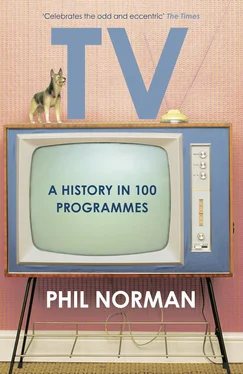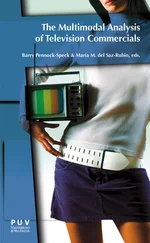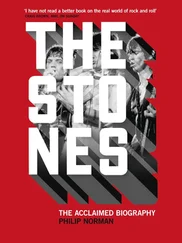As the sixties ran on, Small Time ’s big talents slowly dispersed to the four corners of television: Anderson and company to forge a puppet dynasty, Postgate and Firmin to carve a homely niche in animation, Brush to Saturday night ubiquity, and Young to produce acres of glam rock television. The strand’s last significant signing was Pippy the Tellyphant, a pantomime elephant operated by husband-and-wife team Jimmy and June Kidd, which cost an unprecedented £300 to construct. Pippy provokes few nostalgic reveries these days, while her cheaper, humbler companions, strapped for cash but bursting with ideas, have taken their place in the TV annals. The hearts and minds of millions were won over with cardboard and felt.
THE PHIL SILVERS SHOW (1955–9)
CBS
Sitcom comes of age.
‘Andrew Armstrong, Tree Surgeon’? That’s a television idea? Well, who knows. Look what they did with a fat bus driver.
Bilko’s Television Idea, 12 February 1957
BY THE MID-1950S, SITCOM was already being dismissed by critics as a fad on the wane. It had come a long way in the few short years since its simple beginnings, from the down-to-Earth compactness of The Honeymooners to George Burns hurdling the fourth wall and Lucille Ball’s international stardom with I Love Lucy. Despite this tide of invention, or perhaps because of it, when inspiration began to flag for so much as a season, critics sprang up to predict the death of the American sitcom. The trouble was, as John Crosby observed when hailing The Phil Silvers Show, ‘every time you start to count out situation comedy as a dead duck, something comes along.’31
Master Sergeant Ernest G. Bilko was a new kind of sitcom hero, eight times smarter than the average viewer could hope to be, and a thousandth as honest and hardworking as they claimed to be. Bilko’s essential good nature, fatherly love of his reprobate army platoon, and Phil Silvers’ winning smile were all trotted out as redemptive justifications for the popularity of this good-for-nothing snake, but it was simpler than that. The double-crossing, dissembling, greedy slacker had the American dream down pat – his country was the one serving him.
Though it was, like all sitcoms, an ensemble effort, Bilko had two major creative forces. The fast-talking vaudeville comic Phil Silvers had steadily built up a solid but unspectacular profile since the war, specialising in sketches that showcased his knack for speedy patter and swift ad-libs, usually playing against a taciturn and bewildered stooge. He was paired by CBS executive Hubbell Robinson with writer Nat Hiken, who had moved from local radio comedies to TV variety sketch shows. Steeped in the desperately inventive chicanery of the Broadway milieu, especially its notoriously disingenuous press agents, Hiken saw Silvers in a similarly underhand role. After considering set-ups ranging from baseball team manager to stockbroker to Turkish bath attendant, they settled on the immortal master sergeant.32
Initially titled You’ll Never Get Rich after the lyric from the song ‘You’re In the Army Now’, Hiken’s creation was to its rival sitcoms what Bilko was to his rival sergeants. Previously, one plot reversal had been considered quite enough for the average sitcom’s twenty-four minutes. Hiken put in at least one more, sometimes two or three. Hitherto simple plots of swindling and misapprehension doubled and quadrupled before the viewer’s eyes, finally to be snapped shut again by some spectacularly deft sewing up of strands in the closing seconds. At script meetings, Hiken had a compulsive habit of creating little origami animals as he outlined a plot.33 Whether it was incidents at an army post or scrap paper, the skill was the same – artfully precise manipulation.
The cast ranged in experience from seasoned actor Paul Ford as Bilko’s just-dumb-enough colonel, to complete non-professionals – filthy nightclub comic Joe E. Ross played childlike Mess Sergeant Rupert Ritzik, and hopeless slob Maurice Gosfield played hopeless slob Private Duane Doberman. The bulk of the lines inevitably went to Silvers, but there was a fine balance at work here: Bilko’s corporals Henshaw and Barbella oscillated between willing henchmen and disapproving moralists; the excitable Private Paparelli could often out-talk his sergeant; the chorus of rival sergeants occasionally got one over on their nemesis. The scenes when Bilko and Colonel Hall were alone together remain among the best in sitcom, a perspicacious fox inexorably pulling the wool over the eyes of a sappy bloodhound.
Hiken assembled a crack team of writers around him, including a young Neil Simon, but his obsessive nature meant he could never leave a script alone, often rewriting it into a completely new show. The Writers Guild, suspicious of the prevalence of Hiken’s name on the credits, tried to lobby for the other writers, only to be told by those writers that he really did have significant input to almost every programme.34 Hiken also made regular appearances on the studio floor to fiddle with minuscule details of staging. With so much depending on one man, it was inevitable that later seasons began to slip from the early stratospheric heights.
The decline showed in the increasing use of guest stars. Where previously celebrities would be satirical inventions like inane comedian Buddy Bickford or rock ’n’ roll sensation Elvin Pelvin, now the real-life likes of Ed Sullivan, Mickey Rooney and Kay Kendall would turn up. Setting the pattern for countless comedies hence, it began as a display of the show’s popularity and became a sign of flagging inspiration. The quality level remained high, but the platoon’s move for its final season from Fort Baxter, Kansas to the Californian heat of Camp Fremont held a sad irony.
US television’s big east-to-west move would affect sitcom as much as drama. Though set in Kansas, Bilko was really a New York show, drawn from the Broadway melting pot, infused with Jewish humour and recorded at the old DuMont studios. Over the next few years sitcoms would become slower, simpler and sillier. The dialogue was less snappy and the characters less smart as network bosses sought to woo Middle America. The Phil Silvers Show merely opened with a cartoon; shows like Gilligan’s Island and Mr Ed (the latter backed by George Burns) were cartoons themselves, often not particularly good ones. Add a plethora of Hollywood-produced ‘adult’ western shows and the cosy croon of Perry Como to the evening schedules, and the televisual tide was decisively turning from Hiken’s satirical high water mark. Those critical jeers began to look less precious and more prophetic with each new season. Bilko could outsmart anyone, but he couldn’t cope with being out-dumbed.
Конец ознакомительного фрагмента.
Текст предоставлен ООО «ЛитРес».
Прочитайте эту книгу целиком, купив полную легальную версию на ЛитРес.
Безопасно оплатить книгу можно банковской картой Visa, MasterCard, Maestro, со счета мобильного телефона, с платежного терминала, в салоне МТС или Связной, через PayPal, WebMoney, Яндекс.Деньги, QIWI Кошелек, бонусными картами или другим удобным Вам способом.












